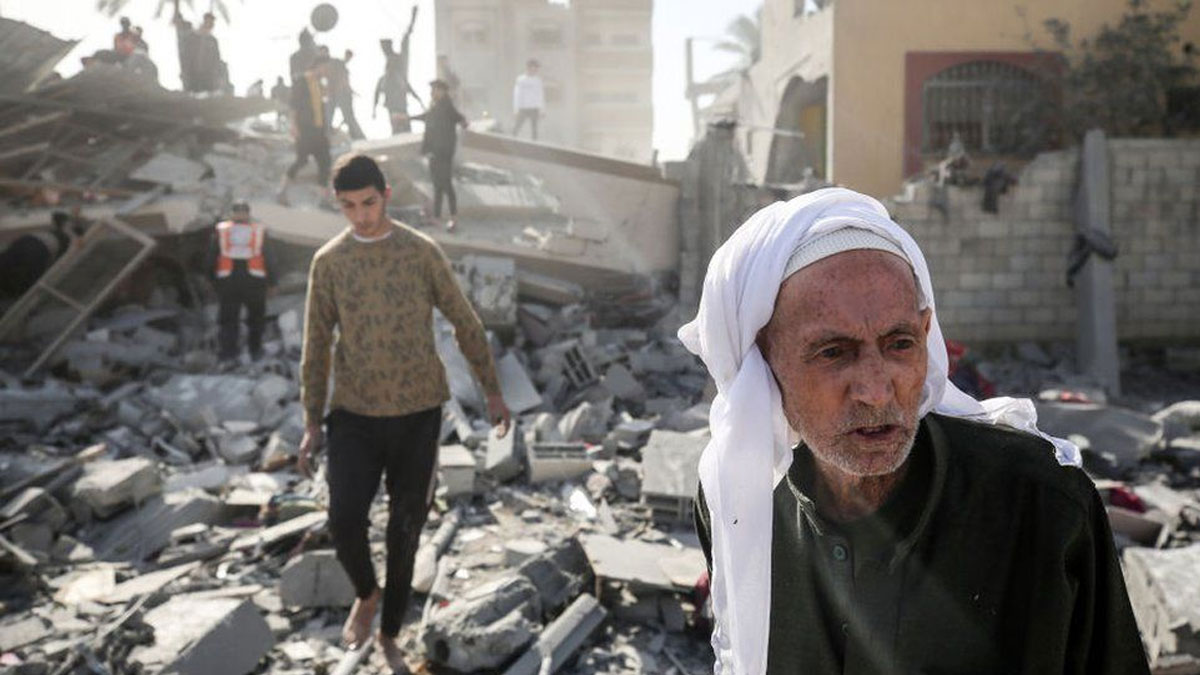Israel Gaza war: Hamas says 70 killed in Israeli air strike on camp
Gaza's Hamas-run health ministry says an Israeli air strike killed at least 70 people in the Al-Maghazi refugee camp in the centre of the strip.

A spokesman said the death toll was likely to rise given the large number of families living in the area.
The Israeli military told the BBC it was looking into reports of the strike.
It comes as Israeli and Arab media say Egypt, which borders the Gaza Strip, has put forward a new proposal for a ceasefire between Israel and Hamas.
Dozens of injured people were rushed from Maghazi to nearby Al-Aqsa Hospital with footage showing some children's faces covered in blood and body bags piled outside.
The health ministry says three houses were hit in the attack late on Sunday.
A father said he had lost his daughter and grandchildren, adding that his family had fled from the north for safety in central Gaza.
"They lived on the third floor of one of the buildings," he said. "The wall collapsed on them. My grandchildren, my daughter, her husband - all gone.
"We are all targeted. Civilians are targeted. There is no safe place. They told us to leave Gaza City - now we came to central Gaza to die."
The Palestine Red Crescent Society says "intense" Israeli air strikes have led to the closure of main roads between Maghazi and two other refugee camps, Al-Bureij and Al-Nuseirat, "hindering the work of ambulances and rescue teams".
In a statement to the BBC, the Israeli military said it had received "reports of an incident in the Maghazi camp".
"Despite the challenges posed by Hamas terrorists operating within civilian areas in Gaza, the IDF [Israeli Defense Forces] is committed to international law including taking feasible steps to minimize harm to civilians," it added.
According to the health ministry, more than 20,000 people have been killed - mostly children and women - and 54,000 injured in Gaza since 7 October, when Hamas and other Palestinian groups attacked Israel, killing 1,200 people and taking about 240 hostages.
Earlier on Sunday, Israeli Prime Minister Benjamin Netanyahu said the war had come at a "very heavy price" for his country.
The Israeli military said more than a dozen soldiers had been killed in Gaza since Friday, bringing the total for the ground offensive launched after 7 October to 156.
Saturday was one of its deadliest days but Mr Netanyahu said there was "no choice" but to keep fighting.
The new ceasefire proposal by Egypt would be implemented in three parts:
The first phase of the ceasefire would see a humanitarian pause of seven to ten days during which Hamas would release all civilian hostages in exchange for some Palestinian prisoners from Israeli jails
In the week-long second phase, Hamas would release all Israeli female soldiers in return for more prisoners and the exchange of corpses held since 7 October
The third phase, which would last a month, would see the release of the remaining hostages and a number of Palestinian prisoners and Israel withdrawing from the Gaza Strip and suspension of all aerial activities.
Indirect negotiations would be held in Egypt with Qatari and US participation.
An Israeli source told Maariv newspaper that the Egyptian initiative could lead to negotiations. Hamas says it is studying the proposal.
Meanwhile, the Danish shipping giant, Maersk, says it is preparing to resume shipping operations through the Red Sea and Gulf of Aden.
The announcement came after an international military operation, led by the US, was deployed to prevent the targeting of commercial ships by drones from areas of Yemen controlled by Houthi rebels. The Houthis have declared their support for Hamas and have said they would target any ship travelling to Israel.
Maersk and other shipping companies stopped sending ships through the Red Sea and the Suez Canal earlier this month as a result of drone attacks. US Central Command said two days ago that a US navy destroyer had shot down four drones in the Red Sea launched from Yemeni territory.
In another development, Pope Francis appealed for peace in the Middle East as he presided over a Christmas Eve Mass at Saint Peter's Basilica in the Vatican.
Referring to the war between Israel and Hamas, the Pope said Jesus's message of peace was being drowned out by the "futile logic of war" in the very land where he had been born.
-bbc





